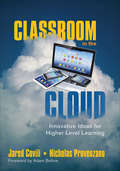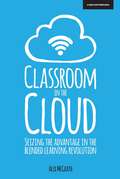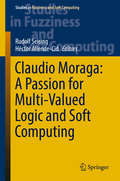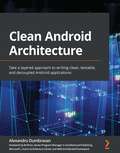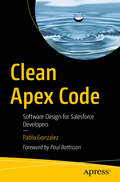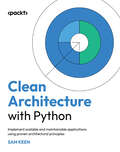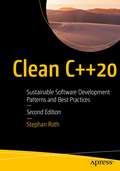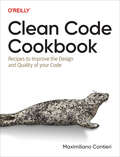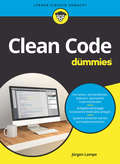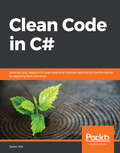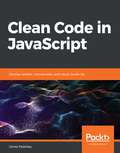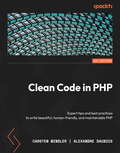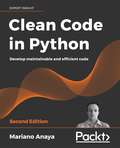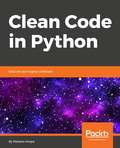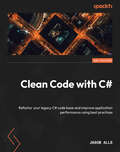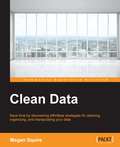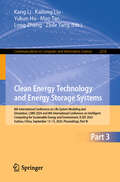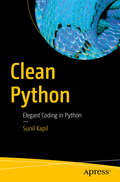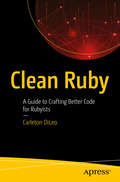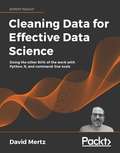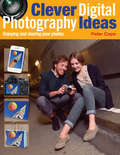- Table View
- List View
Classroom in the Cloud: Innovative Ideas for Higher Level Learning
by Jared Covili Nicholas ProvenzanoThe sky’s not the limit anymore—get your head in the cloud! Making the most of the digital age in education just got easier. With cloud computing, students can connect with teachers, educators can connect with colleagues, and opportunities for meaningful collaboration can grow exponentially. In this easy-to-use primer, the author of bestseller Going Google teams up with Twitter’s The Nerdy Teacher to demonstrate what cloud-based instruction can mean for teachers and students—and how it can work for your school. The book includes Practical tools for integrating cloud computing into the curriculum Student and teacher testimonies detailing examples of cloud-based instruction in action Chapters on storing, communicating, sharing, and creating Strategies for ensuring safety and security for students and information "This book provides direct quotes from teachers and students about amazing cloud-based applications. You’ll find innovative tools and practices, step-by-step instructions for implementation, and an array of tools for all grade levels and subjects. The classroom may now be in the cloud, but this book will be at my side anytime I need tech tools that are creative, easy-to-use, and fun for teaching and learning." Mark Barnes, Author of Teaching the iStudent and 5 Skills for the Global Learner "It’s more important today than ever before for educators to look beyond the walls of classrooms and connect with other colleagues in their buildings and across the globe. This book will equip all educators with the tools necessary to find the best tools to enhance and improve their teaching practices." Steven Anderson, Author, The Relevant Educator and Content Curation, @web20classroom
Classroom in the Cloud: Seizing The Advantage In The Blended Learning Revolution
by Alex McGrathThis book aims to focus the minds of teachers and school leaders to take advantage of the opportunities presented by the online revolution and the emergence of blended learning. The author, who is Head of King's Ely Senior, argues that with planning and co-ordination, huge benefits can be reaped from new ways of learning, complementing the traditions of British education. He looks at the implications for the UK of e-learning practices and techniques that have been introduced overseas and urges teachers and leaders to face the challenges posed by new technology and embrace change.
Classroom in the Cloud: Seizing The Advantage In The Blended Learning Revolution
by Alex McGrathThis book aims to focus the minds of teachers and school leaders to take advantage of the opportunities presented by the online revolution and the emergence of blended learning. The author, who is Head of King's Ely Senior, argues that with planning and co-ordination, huge benefits can be reaped from new ways of learning, complementing the traditions of British education. He looks at the implications for the UK of e-learning practices and techniques that have been introduced overseas and urges teachers and leaders to face the challenges posed by new technology and embrace change.
Claudio Moraga: A Passion for Multi-Valued Logic and Soft Computing (Studies in Fuzziness and Soft Computing #349)
by Rudolf Seising Héctor Allende-CidThe book is an authoritative collection of contributions by leading experts on the topics of fuzzy logic, multi-valued logic and neural network. Originally written as an homage to Claudio Moraga, seen by his colleagues as an example of concentration, discipline and passion for science, the book also represents a timely reference guide for advance students and researchers in the field of soft computing, and multiple-valued logic.
Clean Android Architecture: Take a layered approach to writing clean, testable, and decoupled Android applications
by Alexandru DumbravanLearn how to build, maintain, and test Android applications using clean architecture principlesKey FeaturesUnderstand various software design principles and patterns to make an application more testableStructure your application's code into different layers and components to make it more maintainable and flexibleStudy popular libraries and frameworks and integrate them into an applicationBook DescriptionAs an application's code base increases, it becomes harder for developers to maintain existing features and introduce new ones. In this clean architecture book, you'll learn to identify when and how this problem emerges and how to structure your code to overcome it. The book starts by explaining clean architecture principles and Android architecture components and then explores the tools, frameworks, and libraries involved. You'll learn how to structure your application in the data and domain layers, the technologies that go in each layer, and the role that each layer plays in keeping your application clean. You'll understand how to arrange the code into these two layers and the components involved in assembling them. Finally, you'll cover the presentation layer and the patterns that can be applied to have a decoupled and testable code base. By the end of this architecture book, you'll be able to build an application following clean architecture principles and have the knowledge you need to maintain and test the application easily.What you will learnDiscover and solve issues in Android legacy applicationsBecome well versed in the principles behind clean architectureGet to grips with writing loosely coupled and testable codeFind out how to structure an application's code in separate layersUnderstand the role each layer plays in keeping the application cleanIntegrate existing frameworks and libraries for each layerWho this book is forThis book is for Android developers who want to learn about managing the complexity of their applications, and is also highly recommended for intermediate or advanced Android developers looking for a go-to guide for clean architecture and the integration of various Android technologies. New developers familiar with the fundamentals of Android app development will find this book useful too.
Clean Apex Code: Software Design for Salesforce Developers
by Pablo GonzalezMany developers excel at building solutions in Apex but lack formal training in the core principles of professional software engineering. This book changes that and provides a no-nonsense guide for experienced Salesforce developers ready to master the art of software design. Pragmatic, approachable, and to the point, this book focuses on essential practices like modularity, coupling, cohesion, and testing—not just to write better code, but to improve how teams deliver software. By emphasizing object-oriented programming, dependency injection, and boundaries, it equips you to design systems that are easier to maintain, test, and scale. With fast, reliable tests as a cornerstone, you&’ll learn how great design enables true continuous integration and high-performance software delivery. Through actionable examples and clear explanations, you&’ll learn how to design better systems, reduce complexity, and create codebases that stand the test of time. If you&’re serious about your craft, Clean Apex Code will give you the tools and mindset to think like a professional software engineer and deliver software at a higher level. What You Will Learn Use better names in all software constructs to improve readability and maintainability Apply core software design principles to Apex development Embrace modularity, abstraction, and boundaries to simplify complex systems Leverage dependency injection, and mocking to write fast, modular tests <li class="MsoNormal" style="mso-margin-top-alt: auto; mso-margin-bottom-alt: auto; line-height: normal; mso-list: l0 level1 lf
Clean Architecture with Python: Implement scalable and maintainable applications using proven architectural principles
by Sam KeenFuture-proof your Python projects by creating flexible code that adapts to changing requirements with the help of this hands-on guide to achieving clean architectureKey FeaturesLearn clean architecture through a series of real-world, code-centric examples and exercisesOptimize system componentization, significantly reducing maintenance burden and overall complexityApply clean architecture concepts confidently to new Python projects and legacy code refactoringPurchase of the print or Kindle book includes a free PDF eBookBook DescriptionIn the rapidly evolving tech industry, software applications struggle to keep pace with changing business needs, leaving developers grappling with complex codebases that resist change, ultimately reducing productivity and increasing technical debt. Clean Architecture with Python offers a powerful approach to address these challenges. Drawing from his extensive experience architecting cloud-native systems, Sam Keen helps you transform complex architectural challenges into digestible, implementable solutions. This book teaches essential principles for effective development, emphasizing the Pythonic implementation of clean architecture. Through practical examples, you'll learn how to create modular, loosely coupled systems that are easy to understand, modify, and extend. The book covers key concepts such as the dependency rule, separation of concerns, and domain modeling, all tailored for Python development. By the end of this book, you'll be able to apply clean architecture principles effectively in your Python projects. Whether you're building new systems or managing existing ones, you'll have the skills to create more maintainable and adaptable applications. This approach will enhance your ability to respond to changing requirements, setting you up for long-term success in your development career.What you will learnApply clean architecture principles idiomatically in PythonImplement domain-driven design to isolate core business logicApply SOLID principles in a Pythonic context to improve code qualityStructure projects for maintainability and ease of modificationDevelop testing techniques for cleanly architected Python applicationsRefactor legacy Python code to adhere to clean architecture principlesDesign scalable APIs and web applications using clean architectureWho this book is forIf you're a Python developer struggling with maintaining and extending complex codebases, this book is for you. It's ideal for intermediate developers looking to enhance their architectural skills as well as senior developers seeking to formalize their knowledge of clean architecture in Python. While beginners can benefit, prior experience with Python and object-oriented programming is recommended.
Clean C++20: Sustainable Software Development Patterns and Best Practices
by Stephan RothWrite maintainable, extensible, and durable software with modern C++. This book, updated for the recently released C++20 standard, is a must for every developer, software architect, or team leader who is interested in well-crafted C++ code, and thus also wants to save development costs. If you want to teach yourself about writing better C++ code, Clean C++20 is exactly what you need. It is written for C++ developers of all skill levels and shows by example how to write understandable, flexible, maintainable, and efficient C++ code. Even if you are a seasoned C++ developer, there are nuggets and data points in this book that you will find useful in your work.If you don't take care with your codebase, you can produce a large, messy, and unmaintainable beast in any programming language. However, C++ projects in particular are prone to get messy and tend to slip into a maintenance nightmare. There is lots of C++ code out there that looks as if it was written in the 1980s, completely ignoring principles and practices of well-written and modern C++.It seems that C++ developers have been forgotten by those who preach Software Craftsmanship and Clean Code principles. The web is full of C++ code examples that may be very fast and highly optimized, but whose developers have completely ignored elementary principles of good design and well-written code. This book will explain how to avoid this and how to get the most out of your C++ code. You'll find your coding becomes more efficient and, importantly, more fun.What You Will LearnGain sound principles and rules for clean coding in C++Carry out test-driven development (TDD)Better modularize your C++ code baseDiscover and apply C++ design patterns and idiomsWrite C++ code in both object-oriented and functional programming stylesWho This Book Is ForAny C++ developer or software engineer with an interest in producing better code.
Clean Code Cookbook: Recipes to Improve the Design and Quality of your Code
by Maximiliano ContieriOften, software engineers and architects work with large, complex code bases that they need to scale and maintain. With this cookbook, author Maximiliano Contieri takes you beyond the concept of clean code by showing you how to identify improvement opportunities and their impact on production code. When it comes to reliability and system evolution, these techniques provide benefits that pay off over time.Using real life examples in JavaScript, PHP, Java, Python, and many other programming languages, this cookbook provides proven recipes to help you scale and maintain large systems. Every section covers fundamental concepts including readability, coupling, testability, and extensibility, as well as code smells—symptoms of a problem that requires special attention—and the recipes to address them.As you proceed through this book, refactoring recipes and the variety of code smells increase in complexity. You will:Understand the benefits of clean code and learn how to detect code smellsLearn refactoring techniques step by stepGain illustrative code examples in several modern programming languagesGet a comprehensive catalog of common code smells, their impacts, and possible solutionsUse code that's straight to the point, favoring readability and learning
Clean Code für Dummies (Für Dummies)
by Jürgen LampeClean Code ist eine wichtige Methode, um zu besserer Software zu kommen. Zu beachten sind Korrektheit, Verständlichkeit, Lesbarkeit und Ressourcenverbrauch. Programmieren ist aber mehr als ein Handwerk. Klarer Code ist auch Ausdruck klaren Denkens und beginnt damit schon vor der Niederschrift. Regeln sind wichtige Stützen, aber das eigenständige Denken, Entscheiden und Abwägen ersetzen sie nicht. Leider wird darüber fast nie gesprochen. Das Buch soll helfen, dieses Manko zu beseitigen. Es vermittelt handwerkliche Fertigkeiten, stellt das Programmieren aber gleichzeitig auch in den Gesamtprozess der Softwareentwicklung. Das entlastet Sie als Programmierer!
Clean Code in C#: Refactor your legacy C# code base and improve application performance by applying best practices
by Jason AllsDevelop your programming skills by exploring essential topics such as code reviews, implementing TDD and BDD, and designing APIs to overcome code inefficiency, redundancy, and other problems arising from bad code Key Features Write code that cleanly integrates with other systems while maintaining well-defined software boundaries Understand how coding principles and standards enhance software quality Learn how to avoid common errors while implementing concurrency or threading Book Description Traditionally associated with developing Windows desktop applications and games, C# is now used in a wide variety of domains, such as web and cloud apps, and has become increasingly popular for mobile development. Despite its extensive coding features, professionals experience problems related to efficiency, scalability, and maintainability because of bad code. Clean Code in C# will help you identify these problems and solve them using coding best practices. The book starts with a comparison of good and bad code, helping you understand the importance of coding standards, principles, and methodologies. You'll then get to grips with code reviews and their role in improving your code while ensuring that you adhere to industry-recognized coding standards. This C# book covers unit testing, delves into test-driven development, and addresses cross-cutting concerns. You'll explore good programming practices for objects, data structures, exception handling, and other aspects of writing C# computer programs. Once you've studied API design and discovered tools for improving code quality, you'll look at examples of bad code and understand which coding practices you should avoid. By the end of this clean code book, you'll have the developed skills you need in order to apply industry-approved coding practices to write clean, readable, extendable, and maintainable C# code. What you will learn Write code that allows software to be modified and adapted over time Implement the fail-pass-refactor methodology using a sample C# console application Address cross-cutting concerns with the help of software design patterns Write custom C# exceptions that provide meaningful information Identify poor quality C# code that needs to be refactored Secure APIs with API keys and protect data using Azure Key Vault Improve your code's performance by using tools for profiling and refactoring Who this book is for This coding book is for C# developers, team leads, senior software engineers, and software architects who want to improve the efficiency of their legacy systems. A strong understanding of C# programming is required.
Clean Code in JavaScript: Develop reliable, maintainable, and robust JavaScript
by James PadolseyGet the most out of JavaScript for building web applications through a series of patterns, techniques, and case studies for clean coding Key Features Write maintainable JS code using internal abstraction, well-written tests, and well-documented code Understand the agents of clean coding like SOLID principles, OOP, and functional programming Explore solutions to tackle common JavaScript challenges in building UIs, managing APIs, and writing states Book Description Building robust apps starts with creating clean code. In this book, you'll explore techniques for doing this by learning everything from the basics of JavaScript through to the practices of clean code. You'll write functional, intuitive, and maintainable code while also understanding how your code affects the end user and the wider community. The book starts with popular clean-coding principles such as SOLID, and the Law of Demeter (LoD), along with highlighting the enemies of writing clean code such as cargo culting and over-management. You'll then delve into JavaScript, understanding the more complex aspects of the language. Next, you'll create meaningful abstractions using design patterns, such as the Class Pattern and the Revealing Module Pattern. You'll explore real-world challenges such as DOM reconciliation, state management, dependency management, and security, both within browser and server environments. Later, you'll cover tooling and testing methodologies and the importance of documenting code. Finally, the book will focus on advocacy and good communication for improving code cleanliness within teams or workplaces, along with covering a case study for clean coding. By the end of this book, you'll be well-versed with JavaScript and have learned how to create clean abstractions, test them, and communicate about them via documentation. What you will learn Understand the true purpose of code and the problems it solves for your end-users and colleagues Discover the tenets and enemies of clean code considering the effects of cultural and syntactic conventions Use modern JavaScript syntax and design patterns to craft intuitive abstractions Maintain code quality within your team via wise adoption of tooling and advocating best practices Learn the modern ecosystem of JavaScript and its challenges like DOM reconciliation and state management Express the behavior of your code both within tests and via various forms of documentation Who this book is for This book is for anyone who writes JavaScript, professionally or otherwise. As this book does not relate specifically to any particular framework or environment, no prior experience of any JavaScript web framework is required. Some knowledge of programming is assumed to understand the concepts covered in the book more effectively.
Clean Code in PHP: Expert tips and best practices to write beautiful, human-friendly, and maintainable PHP
by Carsten Windler Alexandre DauboisPractical lessons, examples, and practices from PHP experts on how to take your PHP skills to a professional levelKey FeaturesEasily navigate to key clean code principles specific to PHP development with this hands-on guideLearn the how and why of writing clean code through practical examplesSkip the superfluous knowledge and grasp everything that's relevant to the real-world development environmentBook DescriptionPHP is a beginner-friendly language, but also one that is rife with complaints of bad code,;yet no clean code books are specific to PHP. Enter Clean Code in PHP. This book is a one-stop guide to learning the theory and best practices of clean code specific to real-world PHP app development environments.This PHP book is cleanly split to help you navigate through coding practices and theories to understand and adopt the nuances of the clean code paradigm. In addition to covering best practices, tooling for code quality, and PHP design patterns, this book also presents tips and techniques for working on large-scale PHP apps with a team and writing effective documentation for your PHP projects.By the end of this book, you'll be able to write human-friendly PHP code, which will fuel your PHP career growth and set you apart from the competition.What you will learnBuild a solid foundation in clean coding to craft human-readable codeUnderstand metrics to determine the quality of your codeGet to grips with the basics of automated testsImplement continuous integration for your PHP applicationsGet an overview of software design patterns to help you write reusable codeGain an understanding of coding guidelines and practices for working in teamsWho this book is forThis book is for early-career PHP developers who wish to avoid writing messy code by learning how to write understandable and maintainable code that sets them apart from rest. The book assumes familiarity with PHP coding and principles, but no knowledge of advanced principles will be necessary.
Clean Code in Python: Develop maintainable and efficient code, 2nd Edition
by Mariano AnayaImprove your software engineering practices to tackle inefficiencies, errors, and other perils that emerge due to bad codeKey FeaturesEnhance your coding skills to increase efficiency as well as reflect the new features introduced in Python 3.9Understand how to apply microservices to your legacy systems by implementing practical techniquesLearn to implement the refactoring techniques and SOLID principles in PythonBook DescriptionThe Python language is immensely prevalent in numerous areas, such as software construction, systems administration, and data processing. Experienced professionals in every field face the challenges of disorganization, poor readability, and low testability as a result of unstructured code. With updated code and revised content aligned to the new features of Python 3.9, this second edition of Clean Code in Python will provide you with all the tools you need to overcome these obstacles and manage your projects successfully. The book begins by describing the basic elements of writing clean code and how it plays a key role in Python programming. You will learn about writing efficient and readable code using the Python standard library and best practices for software design. The book delves deeply into object-oriented programming in Python and shows you how to use objects with descriptors and generators. It will also show you the design principles of software testing and how to resolve problems by implementing software design patterns in your code. In the final chapter, we break down a monolithic application into a microservices based one starting from the code as the basis for a solid platform. By the end of this clean code book, you will be proficient in applying industry-approved coding practices to design clean, sustainable, and readable real-world Python code.What you will learnSet up a productive development environment by leveraging automatic toolsLeverage the magic methods in Python to write better code, abstracting complexity away and encapsulating detailsCreate advanced object-oriented designs using unique features of Python, such as descriptorsEliminate duplicated code by creating powerful abstractions using software engineering principles of object-oriented designCreate Python-specific solutions using decorators and descriptorsRefactor code effectively with the help of unit testsBuild the foundations for solid architecture with a clean code base as its cornerstoneWho this book is forThis book will appeal to team leads, software architects, and senior software engineers who want to learn Python coding techniques and work on their legacy systems to save cost and improve efficiency. The book assumes that you have a strong understanding of programming.
Clean Code in Python: Refactor your legacy code base
by Mariano AnayaGetting the most out of Python to improve your codebaseKey FeaturesSave maintenance costs by learning to fix your legacy codebaseLearn the principles and techniques of refactoringApply microservices to your legacy systems by implementing practical techniquesBook DescriptionPython is currently used in many different areas such as software construction, systems administration, and data processing. In all of these areas, experienced professionals can find examples of inefficiency, problems, and other perils, as a result of bad code. After reading this book, readers will understand these problems, and more importantly, how to correct them. The book begins by describing the basic elements of writing clean code and how it plays an important role in Python programming. You will learn about writing efficient and readable code using the Python standard library and best practices for software design. You will learn to implement the SOLID principles in Python and use decorators to improve your code. The book delves more deeply into object oriented programming in Python and shows you how to use objects with descriptors and generators. It will also show you the design principles of software testing and how to resolve software problems by implementing design patterns in your code. In the final chapter we break down a monolithic application to a microservice one, starting from the code as the basis for a solid platform. By the end of the book, you will be proficient in applying industry approved coding practices to design clean, sustainable and readable Python code. What you will learnSet up tools to effectively work in a development environmentExplore how the magic methods of Python can help us write better codeExamine the traits of Python to create advanced object-oriented designUnderstand removal of duplicated code using decorators and descriptorsEffectively refactor code with the help of unit testsLearn to implement the SOLID principles in PythonWho this book is forThis book will appeal to team leads, software architects and senior software engineers who would like to work on their legacy systems to save cost and improve efficiency. A strong understanding of Programming is assumed.
Clean Code with C#: Refactor your legacy C# code base and improve application performance using best practices
by Jason AllsEnhance your programming skills through code reviews, TDD and BDD implementation, and API design to overcome code inefficiency, redundancy, and other issues arising from bad codeKey FeaturesWrite code that seamlessly integrates with other systems while maintaining well-defined software boundariesUnderstand how coding principles and standards elevate software qualityLearn how to avoid common errors while implementing concurrency or threadingPurchase of the print or Kindle book includes a free PDF eBookBook DescriptionTraditionally associated with Windows desktop applications and game development, C# has expanded into web, cloud, and mobile development. However, despite its extensive coding features, professionals often encounter issues with efficiency, scalability, and maintainability due to poor code. Clean Code in C# guides you in identifying and resolving these problems using coding best practices. This book starts by comparing good and bad code to emphasize the importance of coding standards, principles, and methodologies. It then covers code reviews, unit testing, and test-driven development, and addresses cross-cutting concerns. As you advance through the chapters, you’ll discover programming best practices for objects, data structures, exception handling, and other aspects of writing C# computer programs. You’ll also explore API design and code quality enhancement tools, while studying examples of poor coding practices to understand what to avoid. By the end of this clean code book, you’ll have the developed the skills needed to apply industry-approved coding practices to write clean, readable, extendable, and maintainable C# code.What you will learnMaster the art of writing evolvable and adaptable codeImplement the fail-pass-refactor methodology using a sample C# console applicationDevelop custom C# exceptions that provide meaningful informationIdentify low-quality C# code in need of refactoringImprove code performance using profiling and refactoring toolsCreate efficient and bug-free code using functional programming techniquesWrite cross-platform code using MAUIDevelop cloud-deployable microservices for versatile applicationsWho this book is forThis coding book is for proficient C# developers, team leads, senior software engineers, and software architects who want to improve the efficiency of their legacy systems. A strong understanding of C# programming is assumed.
Clean Data
by Megan SquireIf you are a data scientist of any level, beginners included, and interested in cleaning up your data, this is the book for you! Experience with Python or PHP is assumed, but no previous knowledge of data cleaning is needed.
Clean Energy Technology and Energy Storage Systems: 8th International Conference on Life System Modeling and Simulation, LSMS 2024 and 8th International Conference on Intelligent Computing for Sustainable Energy and Environment, ICSEE 2024, Suzhou, China, September 13–15, 2024, Proceedings, Part III (Communications in Computer and Information Science #2218)
by Kang Li Zhile Yang Kailong Liu Long Zhang Yukun Hu Mao TanThe five-volume set constitutes the thoroughly refereed proceedings of the 8th International Conference on Life System Modeling and Simulation, LSMS 2024, and of the 8th International Conference on Intelligent Computing for Sustainable Energy and Environment, ICSEE 2024, which were held during September 13-15, in Suzhou, China. The 29 papers presented were carefully reviewed and selected from over 496 submissions. The LSMS and ICSEE international conference series aim to bring together international researchers and practitioners in the fields of advanced methods for life system modeling and simulation, as well as advanced intelligent computing theory, methodologies, and engineering applications in achieving net zero across all sectors to tackle the global climate change challenge.
Clean Python: Elegant Coding in Python
by Sunil KapilDiscover the right way to code in Python. This book provides the tips and techniques you need to produce cleaner, error-free, and eloquent Python projects. Your journey to better code starts with understanding the importance of formatting and documenting your code for maximum readability, utilizing built-in data structures and Python dictionary for improved maintainability, and working with modules and meta-classes to effectively organize your code. You will then dive deep into the new features of the Python language and learn how to effectively utilize them. Next, you will decode key concepts such as asynchronous programming, Python data types, type hinting, and path handling. Learn tips to debug and conduct unit and integration tests in your Python code to ensure your code is ready for production. The final leg of your learning journey equips you with essential tools for version management, managing live code, and intelligent code completion. After reading and using this book, you will be proficient in writing clean Python code and successfully apply these principles to your own Python projects. What You’ll Learn Use the right expressions and statements in your Python code Create and assess Python Dictionary Work with advanced data structures in Python Write better modules, classes, functions, and metaclassesStart writing asynchronous Python immediatelyDiscover new features in Python Who This Book Is ForReaders with a basic Python programming knowledge who want to improve their Python programming skills by learning right way to code in Python.
Clean Ruby: A Guide to Crafting Better Code for Rubyists
by Carleton DiLeoLearn how to make better decisions and write cleaner Ruby code. This book shows you how to avoid messy code that is hard to test and which cripples productivity. Author Carleton DiLeo shares hard-learned lessons gained from years of experience across numerous codebases both large and small. Each chapter covers the topics you need to know to make better decisions and optimize your productivity. Many books will tell you how to do something; this book will tell you why you should do it. Start writing code you love. What You Will Learn Build better classes to help promote code reuse Improve your decision making and make better, smarter choicesIdentify bad code and fixed itCreate quality names for all of your variables, classes, and modules Write better, concise classesImprove the quality of your methodsProperly use modules Clarify your Boolean logic See when and how you refactorImprove your understanding of TDD and write better tests Who This Book Is ForThis book is written for Ruby developers. There is no need to learn a new language or translate concepts to Ruby.
Cleaning Data for Effective Data Science: Doing the other 80% of the work with Python, R, and command-line tools
by David MertzA comprehensive guide for data scientists to master effective data cleaning tools and techniquesKey FeaturesMaster data cleaning techniques in a language-agnostic mannerLearn from intriguing hands-on examples from numerous domains, such as biology, weather data, demographics, physics, time series, and image processingWork with detailed, commented, well-tested code samples in Python and RBook DescriptionIt is something of a truism in data science, data analysis, or machine learning that most of the effort needed to achieve your actual purpose lies in cleaning your data. Written in David's signature friendly and humorous style, this book discusses in detail the essential steps performed in every production data science or data analysis pipeline and prepares you for data visualization and modeling results. The book dives into the practical application of tools and techniques needed for data ingestion, anomaly detection, value imputation, and feature engineering. It also offers long-form exercises at the end of each chapter to practice the skills acquired. You will begin by looking at data ingestion of data formats such as JSON, CSV, SQL RDBMSes, HDF5, NoSQL databases, files in image formats, and binary serialized data structures. Further, the book provides numerous example data sets and data files, which are available for download and independent exploration. Moving on from formats, you will impute missing values, detect unreliable data and statistical anomalies, and generate synthetic features that are necessary for successful data analysis and visualization goals. By the end of this book, you will have acquired a firm understanding of the data cleaning process necessary to perform real-world data science and machine learning tasks.What you will learnHow to think carefully about your data and ask the right questionsIdentify problem data pertaining to individual data pointsDetect problem data in the systematic “shape” of the dataRemediate data integrity and hygiene problemsPrepare data for analytic and machine learning tasksImpute values into missing or unreliable dataGenerate synthetic features that are more amenable to data science, data analysis, or visualization goals.Who this book is forThis book is designed to benefit software developers, data scientists, aspiring data scientists, and students who are interested in data analysis or scientific computing.Basic familiarity with statistics, general concepts in machine learning, knowledge of a programming language (Python or R), and some exposure to data science are helpful. A glossary, references, and friendly asides should help bring all readers up to speed.The text will also be helpful to intermediate and advanced data scientists who want to improve their rigor in data hygiene and wish for a refresher on data preparation issues.
Cleaning Windows XP For Dummies
by Allen WyattThis wide-ranging guide helps ordinary users fight back against Windows slowdowns, glitches, and annoyancesWindows is the world's dominant desktop operating system, with 93.8 percent of the market as of 2002Packed with savvy tips for decluttering a system, speeding up access to programs and data, customizing the interface, rooting out resource hogs, tuning up e-mail and Web browser performance, protecting against viruses, and moreFocuses on Windows XP and covers the new Service Pack 2, but many techniques are applicable to older Windows versions
Clever Digital Photography Ideas
by Peter CopeA practical, accessible guide to the ingenious and creative things that can be done with a digital compact or camera phone. Clever Digital Photography Ideas: Starting to make the most of your camera or camera phone is a chapter from the book 100 Clever Digital Photography Ideas and provides a variety of simples ideas for getting even more from your camera or camera phone than just a record of those memorable moments. This includes exploring the camera's functions, ingenious ways to record information and photography your hobbies and interests.All ideas and projects are presented with easy to follow instructions and striking photographs across colourful pages. Open your eyes to the creative possibilities with your digital photo technology, from using a basic compact camera to the latest smart phone. Whether a novice or a pro, Clever Digital Photography Ideas: Starting to make the most of your camera or camera phone will show you how to break out of your comfort zone and try something exciting and new.
Clever Digital Photography Ideas - Enjoying and sharing your photos
by Peter CopeA practical, accessible guide to the ingenious and creative things that can be done with a digital compact or camera phone. Clever Digital Photography Ideas: Enjoying and sharing your photos is an extract from the book 100 Clever Digital Photography Ideas and provides a variety of simples ideas to take your photographs beyond the photo frame or photo album. Digital technology has meant that you can print on almost anything in virtually any size, from everyday canvases to the more creative mobile phone cases, and wallpaper! You can create your own Hockney joiner or Banksy style artwork, and you can share your photos online through websites and blogs. There are even clever ideas for selling your photographs.All ideas and projects are presented with easy to follow instructions and striking photographs across colourful pages. Open your eyes to the creative possibilities with your digital photo technology, from using a basic compact camera to the latest smart phone. Whether a novice or a pro, Clever Digital Photography Ideas: Enjoying and sharing your photos will show you how to break out of your comfort zone and try something exciting and new.
Clever Digital Photography Ideas - Extending and enhancing your camera skills and more clever ideas
by Peter CopeA practical, accessible guide to the ingenious and creative things that can be done with a digital compact or camera phone. Clever Digital Photography Ideas: Extending and enhancing your camera skills and more clever ideas is an extract from the book 100 Clever Digital Photography Ideas and provides a variety of simples ideas for pushing your camera skills that little but further. From how you can shoot when conditions get a bit extreme, to creating breath-taking panoramas, and even three-dimensional photos. Shooting movies is also covered, with some ingenious ideas to become more creative in the movie-making arena. There are also clever ideas for protecting your photos for the future, including shooting in RAW. The second part of the eBook covers getting more from your camera and camera phone, guiding you through what all the buttons and jargon mean, as well as clever ideas for extending your battery life and fun ways to use your old camera.All ideas and projects are presented with easy to follow instructions and striking photographs across colourful pages. Open your eyes to the creative possibilities with your digital photo technology, from using a basic compact camera to the latest smart phone. Whether a novice or a pro, Clever Digital Photography Ideas: Extending and enhancing your camera skills and more clever ideast will show you how to break out of your comfort zone and try something exciting and new.
